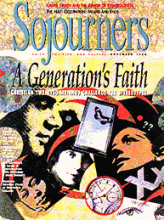I grew up in rural Mississippi, a black girl who lived "out in the booneys," fairly isolated from peers outside school. My God-fearing parents brought me up in an African Methodist Episcopal church that stood just beyond the edge of the woods. At the right age, I waded into a muddy watering hole, only recently vacated by the cows who drank there, and got dunked by the preacher and welcomed into the church and the kingdom of God.
That was my baptism, but I wouldnt call it a conversion experience. I felt very innocent then, and would until I left home for college in Massachusetts. There I got my first taste of diversity. Most of my classmates didnt believe as I did. Most of my African-American friends felt as if my faith was some kind of relic from our slave heritage, a white-supremacist trick that I had bought into.
Up until then I hadnt had any inclination to become political, and life hadnt given me any reason to be angry. I still havent learned these traits well, even though it was in the educated Northeast, not the backwoods of Dixie, that I personally experienced the pain of racial hatred, sexism, and religious bigotry for the first time.
Through Gods grace and relationship with other Christians, I survived college with my sanity intact, and with a clearer, though less innocent, understanding of the world. In retrospect I see that we were all confused, all trying to figure life out.
I have returned to the South and settled in a racially mixed community of Christians, among people who recognize the equality of humanity implied by the statement "all have sinned and fall short of the glory of God." Im sure my generation will continue to struggle with meaning, identity, and purpose until they come to realize that, from an eternal perspective, the only equal opportunity that matters is our equal access to Gods grace.
Read the Full Article

